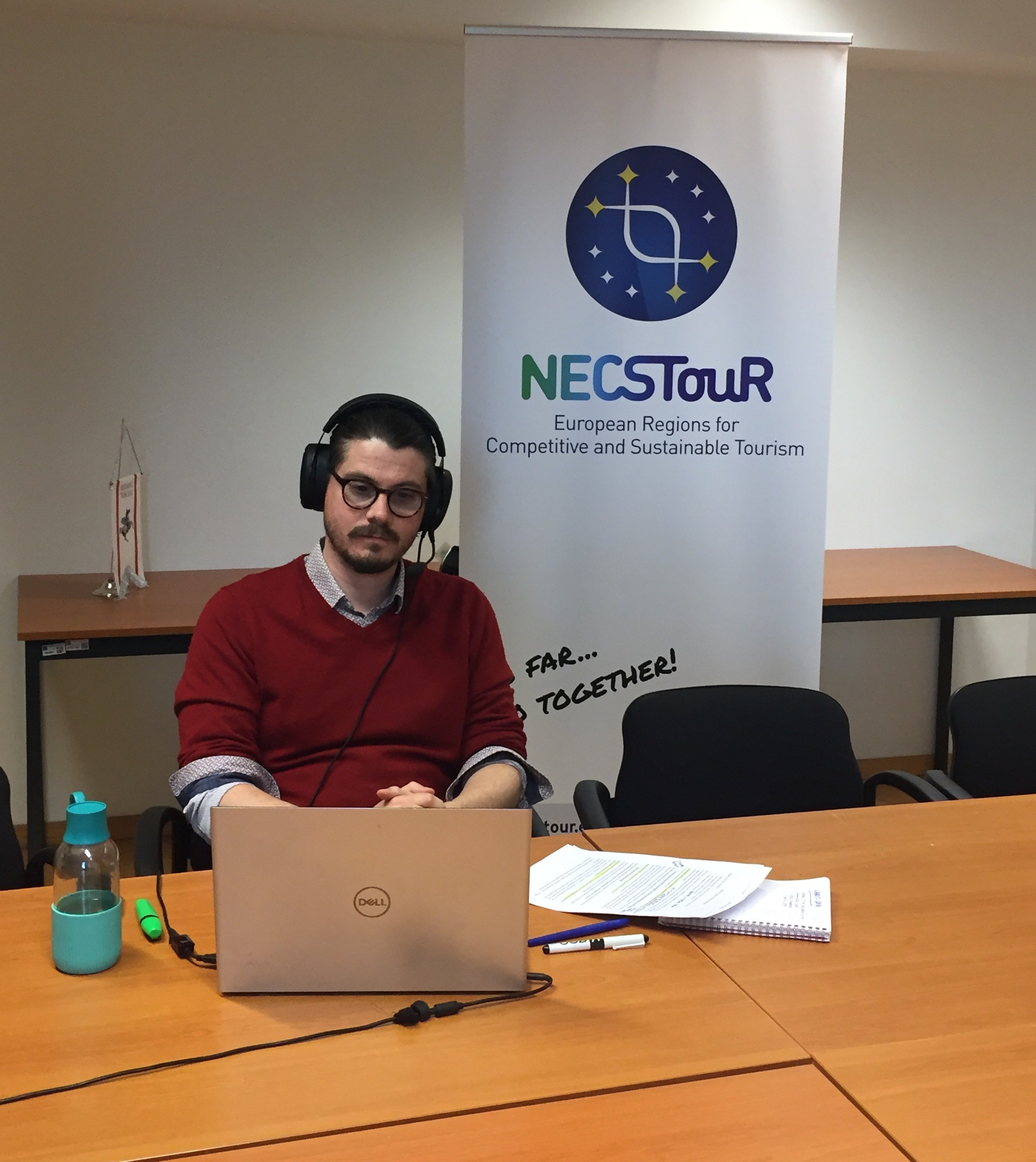
NECSTouR advocates for coordination on data use during HERIT DATA Final Conference
-
07/04/2022
The Interreg MED project HERIT DATA showcased projects results during their Final Conference held from Madrid on the 7th of April. HERIT DATA partners includes our members from Tuscany, Occitanie and Valencia region and our friends from CPMR or Avitem. NECSTouR was invited to share our opinions on HERIT DATA policy recommendations while promoting the Tourism of Tomorrow Lab.
The conference titled “Capitalising experiences and tools for mass tourism management in Mediterranean heritage sites through open data” focused on the achievements of the HERIT DATA project, based on their project pilot’s actions conducted in six natural/cultural heritage sites from the project partner countries. The conference gathered around 75 participants from the private sector, regional authorities, public institutions, and strategic alliances. The event was hosted by the CPMR’s Intermediterranean Commission (CPMR-IMC) and promoted the different apps used, like Feel Florence or Snap4City in Port of the Valencia.
Full report on HERIT DATA website: https://herit-data.interreg-med.eu/what-we-achieve/results/final-conference/
NECSTouR advocates for a common methodological framework in the EU and more funds to develop data skills
The HERIT DATA presented a series of 10 policy recommendations for sustainable tourism. The session was moderated by our member Occitanie Region, another partner in the HERIT-DATA project. Thomas Guillot, project officer in NECSTouR Permanent Secretariat, selected two of them and presented the corresponding NECSTouR strategic actions.
HERIT DATA Policy recommendation: Advocates at EU level for a Common Methodological Framework to measure and monitor tourism sustainability at the national and subnational level, reaching the local level. The framework should not be limited to tourism data, but to the whole set of data relevant to understanding the complexity of tourism.
This recommendation suits perfectly with the Tourism of Tomorrow Lab, who delivers services as a common data department for any destination involved.
“The lack of sustainability data in the tourism sector limits the possibility of any EU territory to align with EU Green Deal and the Digital priority because we cannot assess the performance nor the impacts of the policies to decarbonise, set and monitor climate action plans, where tourism is included overall, and implement the Green Deal strategies. This problem is common to many regions and DMOs in Europe. Using a set of standard basic indicators could make benchmarking between destinations more viable and facilitate the setting of doable targets based on values obtained by similar destinations”.
HERIT DATA Policy recommendation: Encourages the EU to allocate more funds to train tourism destination stakeholders regarding data collection, data analysis, and the communication of data and resulting information.
The Tourism of Tomorrow Lab is also validating this idea: the main constraint of DMOs are skills, not data. Tourism of Tomorrow Lab users benefit from developing skills and improve their use of data. Their investment in data is directed and rationalized through ToT Lab while creating a community.
“Our vision is a future where destinations are fully sustainable, integrating the well-being of tourists, communities and the natural environment while bringing prosperity to the sector. Our mission is to support a transformation to data-oriented organizations through collaboration between DMOs and private partners. Our scope of action is helping build in-house business intelligence hubs, working directly with the destinations, and with the rest of the ecosystem and SMEs”.
Keynotes from the EU
Our intervention was preceded by keynote speakers from the European institutions then shared insightful presentations on sustainable tourism in the Mediterranean and followed by Anna Grimault from ERRIN, the European Regions Research and Innovation Network, gave an overview of her network initiatives in line with HERIT DATA's policy recommendations.
Ms Ramune Genzbigelyte Venturi from DG Internal Market Industry, Entrepreneurship and SMEs introduced the Transition Pathway for Tourism to foster the green and digital transition of the tourism sector, where NECSTouR and its region are heavily involved through the call for commitments. Ms Josianne Cutajar MEP & member of Seas, Rivers, Islands and Coastal Areas Intergroup (SEArica) tackled the issue of resilience of the tourism sector calling for the creation of a proper legislation and data governance: “We need to make the sector as resilient as possible to prepare realistically for the future”.
Sign HERIT DATA MoU!
NECSTouR invites all its member to sign the Memorandum of Understanding of the HERIT DATA project on sustainable heritage management towards mass tourism impact thanks to a holistic use of big and open data.
We wish good luck to the partnership for the follow-up of their results. Our lead partner in the Interreg MED Sustainable Tourism community, the Diputacio de Barcelona (DIBA) was in Madrid to present our related deliverables (The second edition of our Catalogue of outputs and the future Handbook on how to fund tourism through EU funds).
The Interreg MED HERIT-DATA project brings together 12 partners from 7 countries of the Mediterranean basin with the common goal to find a solution to the negative impacts of mass tourism on coastal and cultural/historical areas (e.g. UNESCO World Heritage sites). The project have developed, tested and offered new planning instruments to enhance a responsible tourism management, to improve the quality of life of local citizens and visitors and to strengthen the conservation of the Mediterranean heritage.